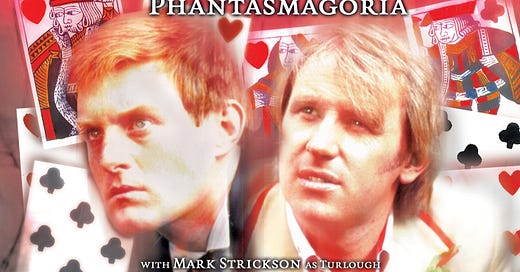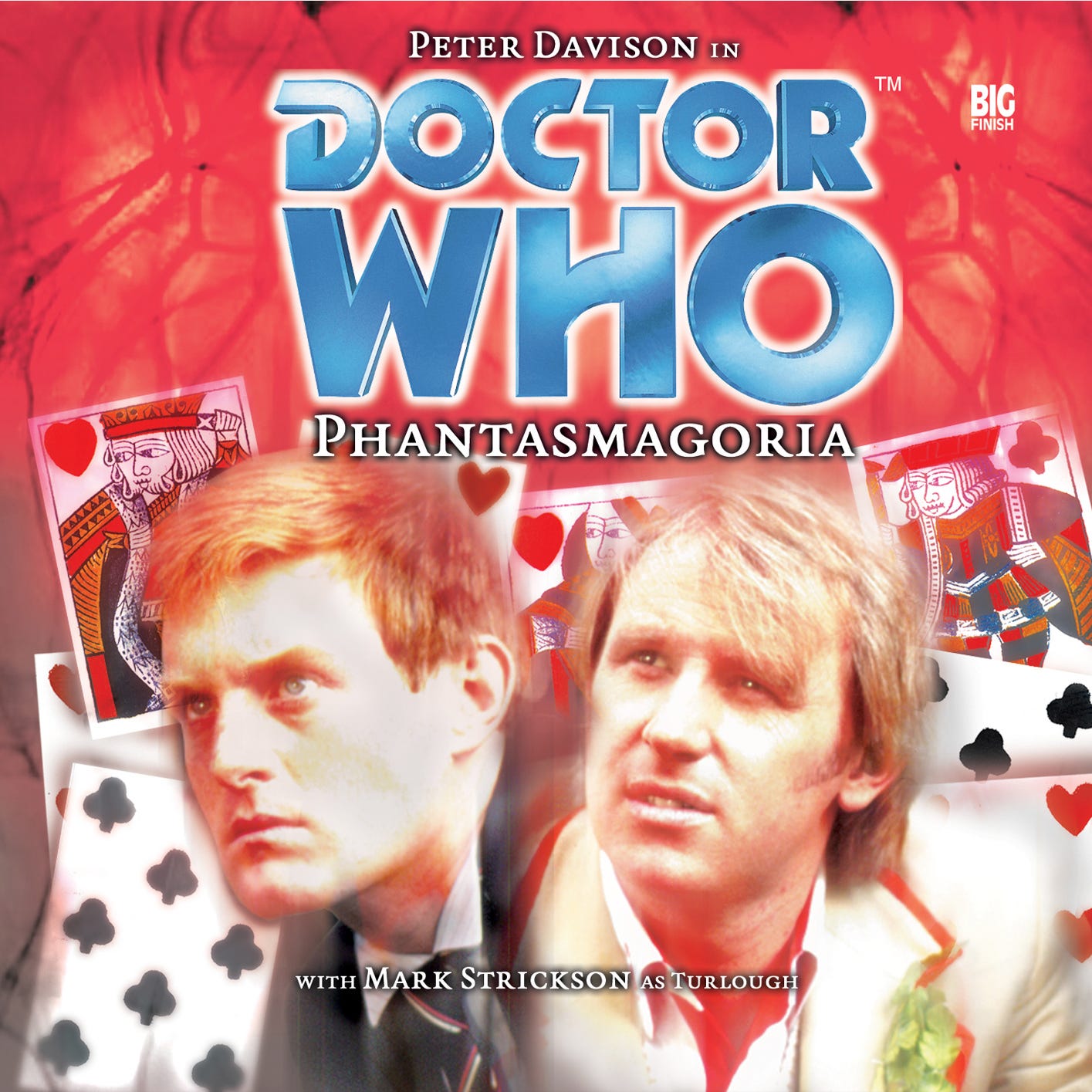By the point in January that I listen to this, the festive season already feels like a distant memory. I’ve been back at work in Birmingham for a week, and the glow of Christmas lights and New Year’s celebrations has been replaced by the dull routine of early mornings and cold commutes. Evenings, at least, have been consumed by the TV show Traitors—we (like everyone else) have been utterly obsessed with the third series, binging it at every opportunity. Meanwhile, Phoebe, our elderly Whippet, seems to have decided that 2025 is best spent in hibernation, barely stirring from her bed while it’s this cold. With that in mind, I needed something atmospheric to shake off the post-holiday slump, so it’s lucky that our second adventure is Phantasmagoria, a story that promises gothic intrigue, candlelit horror, and a generous dose of Mark Gatiss’s love for the macabre.
Phantasmagoria starts with the soft clip-clop of horses’ hooves. A bell tolling mournfully. The gentle shouts of trading merchants. The wind in my face… Admittedly, the wind is because I was listening to this story while walking from the car park to the office, but the atmospherics of the opening scene feel just as real. Already, this is a much more confident-sounding release than The Sirens of Time before it, and, helped by a suitably absorbing script from Mark Gatiss, interesting characters, and almost uniformly strong performances, this is a very good start to the bread-and-butter of the Big Finish range.
And make no mistake, this release is very Mark Gatiss. If you’ve read his novels like The Vesuvius Club or The Devil In Amber, then you’ll know what to expect: bold, camp characterisations, sneaky modern twists within a rich historical period, and a jolly good throwaway adventure that professes to be nothing more than a jolly good throwaway adventure. All those Gatiss hallmarks are here in spades.
The premise is enticing—London in 1702, where card players are vanishing into thin air, and a certain Sir Nicholas Valentine (David Ryall) seems to be at the heart of it all. The Doctor and Turlough arrive and quickly find themselves drawn into a world of scheming gamblers, aristocratic cruelty, and ghostly whispers that signal impending doom. Gatiss leans hard into gothic horror traditions, and the result is a well-constructed mystery with plenty of eerie set pieces. There’s something wonderfully macabre about the way Valentine ensnares his victims, and the story builds tension effectively as the Doctor unpicks the truth behind the disappearances.
However, Phantasmagoria does have its flaws. The plot meanders a little in the middle, and while the supporting cast is entertaining—especially a pre-fame David Walliams as the foppish Quincy Flowers—the characters don’t always feel vital to the progression of the story. The camp, gothic tone is delightful, but it sometimes feels like it’s doing the heavy lifting to make up for the lack of forward momentum. Then, just as things risk losing their grip, we get the brilliant Part Three cliffhanger about the true identity of Major Billy Lovemore—a genuine Doctor Who twist, beautifully delivered. I remember audibly gasping the first time I heard it, And even though I knew it was coming this time around, it was still incredibly satisfying. It almost made smile… which, in January, is no mean feat.
One of Phantasmagoria’s greatest strengths is its atmosphere. The sound design is evocative, with the background noise of candlelit gaming houses, clinking glasses, and hushed voices helping to bring 18th-century London to life. The ghostly whispers that accompany Valentine’s victims’ disappearances are a particularly creepy touch. However, the direction isn’t quite as dynamic as later Big Finish releases. Some of the action sequences feel a little flat, and there are moments where the script leans too heavily on exposition rather than letting the tension build naturally, which sometimes make this feel a little more like a traditional radio play than a fully immersive audio drama.
Turlough’s presence here is interesting. He’s not quite as sassy or sarcastic as he was on TV, and Mark Strickson doesn’t quite recapture the same performance with the ease that Peter Davison does. But he gets things to do, which wasn’t always the case for him in Doctor Who’s twentieth season. His scenes with Quincy Flowers and Edmund Carteret are some of my favourites in the whole story—not necessarily because they move the plot forward, but because they’re genuinely fun to listen to.
Valentine is an excellent villain. David Ryall hams up every scene he’s in, and in any other story, I might say he overacts. But here? He fits the tone perfectly, delivering the sort of delightfully over-the-top villainy that Gatiss loves. The only real issue is that Part Four has to work overtime to wrap everything up. After spending so much time basking in the story’s atmosphere, suddenly we have to get everything resolved, and it’s a bit exhausting keeping up with what everyone is doing. Ideally, a little of that action could have been spread into Part Three—but then we’d have lost that fantastic cliffhanger, so I’m willing to let it slide.
In terms of continuity, Phantasmagoria slots neatly into the later Fifth Doctor era, just before Planet of Fire. It doesn’t draw heavily on surrounding stories, but its slightly darker tone and gothic leanings feel very at home in Season 21’s more dramatic storytelling. More broadly, the themes of deception, power, and predatory aristocracy fit well within Doctor Who’s historical-horror tradition. The title itself—Phantasmagoria—suggests illusion and trickery, and the story leans into this with its Faustian themes of gamblers falling victim to something they don’t fully understand. It’s a classic ghost story in Doctor Who clothing, and that’s where its greatest appeal lies.
Quick Take
Phantasmagoria is a richly atmospheric gothic mystery, packed with Mark Gatiss’s signature blend of historical horror and playful camp. The sound design brings 18th-century London to life, while David Ryall’s delightfully over-the-top villainy adds to the fun. Though the plot meanders at times and the pacing stumbles in the final act, the eerie set pieces and a killer cliffhanger make this a strong early entry in Big Finish’s Doctor Who range. If you’re in the mood for candlelit intrigue and ghostly whispers, this is well worth a listen. Phantasmagoria is a richly atmospheric gothic mystery, packed with Mark Gatiss’s signature blend of historical horror and playful camp. The sound design brings 18th-century London to life, while David Ryall’s delightfully over-the-top villainy adds to the fun. Though the plot meanders at times and the pacing stumbles in the final act, the eerie set pieces and a killer cliffhanger make this a strong early entry in Big Finish’s Doctor Who range. If you’re in the mood for candlelit intrigue and ghostly whispers, this is well worth a listen.





